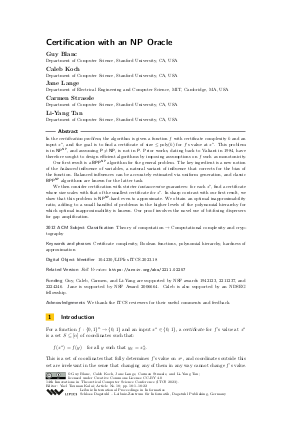@InProceedings{blanc_et_al:LIPIcs.ITCS.2023.18,
author = {Blanc, Guy and Koch, Caleb and Lange, Jane and Strassle, Carmen and Tan, Li-Yang},
title = {{Certification with an NP Oracle}},
booktitle = {14th Innovations in Theoretical Computer Science Conference (ITCS 2023)},
pages = {18:1--18:22},
series = {Leibniz International Proceedings in Informatics (LIPIcs)},
ISBN = {978-3-95977-263-1},
ISSN = {1868-8969},
year = {2023},
volume = {251},
editor = {Tauman Kalai, Yael},
publisher = {Schloss Dagstuhl -- Leibniz-Zentrum f{\"u}r Informatik},
address = {Dagstuhl, Germany},
URL = {https://drops.dagstuhl.de/entities/document/10.4230/LIPIcs.ITCS.2023.18},
URN = {urn:nbn:de:0030-drops-175217},
doi = {10.4230/LIPIcs.ITCS.2023.18},
annote = {Keywords: Certificate complexity, Boolean functions, polynomial hierarchy, hardness of approximation}
}

 Creative Commons Attribution 4.0 International license
Creative Commons Attribution 4.0 International license
























